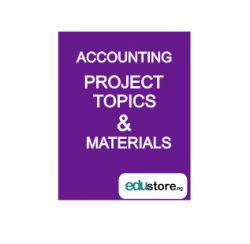Management Decision Making In Primary Schools And The Function Of Teachers In Southeast Senatorial Zone
TABLE OF CONTENT
Title page
Approval page
Dedication
Acknowledgment
Abstract
Table of content
CHAPETR ONE
1.0 INTRODUCTION
1.1 Background of the study
1.2 Statement of problem
1.3 Objective of the study
1.4 Research Hypotheses
1.5 Significance of the study
1.6 Scope and limitation of the study
1.7 Definition of terms
1.8 Organization of the study
CHAPETR TWO
2.0 LITERATURE REVIEW
CHAPETR THREE
3.0 Research methodology
3.1 sources of data collection
3.3 Population of the study
3.4 Sampling and sampling distribution
3.5 Validation of research instrument
3.6 Method of data analysis
CHAPTER FOUR
DATA PRESENTATION AND ANALYSIS AND INTERPRETATION
4.1 Introductions
4.2 Data analysis
CHAPTER FIVE
5.1 Introduction
5.2 Summary
5.3 Conclusion
5.4 Recommendation
Appendix
Abstract
This study was on management decision-making in primary schools and the function of teachers in south East senatorial zone. The total population for the study is 200 staffs of selected primary schools in Enugu local government of Enugu state. The researcher used questionnaires as the instrument for the data collection. Descriptive Survey research design was adopted for this study. A total of 133 respondents made headmasters, class teachers, teachers and headmistresses were used for the study. The data collected were presented in tables and analyzed using simple percentages and frequencies
Chapter one
Introduction
- Background of the study
Decision making was thought of as management function by itself. But now days, researchers and management authority relate decision-making with a collaborative work. This is because the changes in the educational system call for rethinking, reformulating and restructuring of educational policies both at national and school levels. Among other things, the Nigerian Education and Training Policy (MOE, 1994) gave a special attention and action priority to the change of educational organization and management of the country. The concept of the policy is the evolution of a decentralized, efficient and professionals, coordinated participatory system with respect to administration and management of the education system. Accordingly, the educational management of the school was set to a democratic leadership by School Board and Parent-Teacher Association committee consisting of members from the community, teachers and students. The implementation strategy of the policy created a mechanism by which teachers participate in preparation, implementation, evaluation and decision of the curriculum (MOE, 2010)
Due to the growing appreciation of the need for valid, knowledgeable inputs in administrative decision making from various organization levels, the need for involving stakeholders in decision-making is of paramount importance (Wekesa, cited in Mualuko et al ,2009,). Among other groups, very important groups who need to be involved in decision–making in schools are teachers. “Teachers are the custodians of instruction, implementers of school policies and coorganizers for school activities. Further, the decisions made in schools affect them and as professionals and specialists in different subject areas, they are better suited to make the correct decisions having in mind what is required of them as teachers” (Mualuko, 2009 p, 392). Much agreement is offered to the fact that teachers can take a larger role in the overall success of the school when committed to being active participants in the decision making process. A number of researchers have studied the relationship which increased teacher’s involvement in decision–making may have with a number of important school variables. One important aspect for teacher’s involvement in decision making is individual’s growth and development. Smylie (1996) discusses that participation improves teachers‟ opportunities in acquiring new knowledge and insights. These opportunities respectively enhance instructional implementation and students‟ outcomes. Thus, if teachers participate in school decision-making, better decisions would make and, hence, student’s achievement would improve.
Another issue considered for teacher’s participation in decision making is its importance to enhance a sense of democratic involvement. With regard to this Dachler and Wilpert (1978) state that democratic participation reflects the belief that offering the opportunity to participate in the governance of an organization is a moral imperative because individuals have the right to exercise some control over their work and their lives. Imber and Nedit (cited in Hayes, 1996) write that “greater participation in school was in tune with democratic society and led to enhance commitment, improve performance and better productivity in the school”.
Statement of the problem
It is argued that school systems must be restructured in a way they give teachers more space to participate in school based decision-making. School headmasters are also responsible for encouraging teachers‟ involvement in different areas of school decision–making. In a situation where decision is made independently by headmasters, teachers‟ commitment and initiation for effective implementation as well as proper utilization of resource in decision–making could be questionable. In this regard, Irwins (1996) explains that management is decision–making. Nevertheless, it is impossible to conclude that only managers make decision. Important decisions need to be made by consensus; that is everyone should agree to that decision and for its acceptance everyone must speak up, open to hearing each other’s need, and be patient and honest.
Consequently, teachers‟ limited involvement in school decision–making has become the great concern in secondary schools of south east senatorial zone. This may be because of the schools have many staff members when we compare with rural primary schools.
Objective of the study
The objective of the study are;
- To examine the extent of school teachers‟ involvement in decision–making in primary school of south east senatorial zone
- To identify areas of decision issues in which teachers mostly involve in primary school
- To identify factors that influence teachers‟ involvement in decision–making in primary school of south east senatorial zone
Research hypotheses
For the successful completion of the study, the following research hypotheses were formulated by the researcher;
H0: there are no areas of decision issues in which teachers mostly involve in primary school
H1: there are areas of decision issues in which teachers mostly involve in primary school
H02: there are no factors that influence teachers‟ involvement in decision–making in primary school of south east senatorial zone
H2: there are factors that influence teachers‟ involvement in decision–making in primary school of south east senatorial zone
Significance of the study
The involvement of teachers in decision-making at all levels of the school system is very important for the well-being of the schools. Therefore, this study is believed to make the following contributions.
- The study may increase awareness for PTA, school headmasters, teachers, students and educational office about the importance of participatory decision making so that schools can be able to utilize teachers‟ potential and experience for better problem solving skills.
- It may help the school headmasters share schools‟ problems with all teachers and make sound decision.
- The study would forward recommendations that may help teachers‟ involvement in decision making process.
- The study may give some clues for further study.
Scope and limitation of the study
The scope of the study covers management decision making in primary schools and the function of teachers in south east senatorial zone. The researcher encounters some constrain which limited the scope of the study;
- a) AVAILABILITY OF RESEARCH MATERIAL: The research material available to the researcher is insufficient, thereby limiting the study
- b) TIME: The time frame allocated to the study does not enhance wider coverage as the researcher has to combine other academic activities and examinations with the study.
1.7 DEFINITION OF TERMS
Decision Making: – is the act of making up on one’s mind about something, or position or opinion or judgment reached after consideration. It is a thinking process, with lots of mental activity involved in choosing between alternatives (Mekuria, 2009, p.7).
Extent of Participation:- is the magnitude to which teachers take part with others with specified rights and obligations in school decision making.
Teachers’ Involvement: – is a participative process that uses the entire capacity of teachers and design to encourage increased commitment to organization‟s success (Robbins, 2003, p.62).
DOWNLOAD COMPLETE WORK- For Reference Only: Materials are for research, citation, and idea generation purposes and not for submission as your original final year project work.
- Avoid Plagiarism: Do not copy or submit this content as your own project. Doing so may result in academic consequences.
- Use as a Framework: This complete project research material should guide the development of your own final year project work.
- Academic Access: This platform is designed to reduce the stress of visiting school libraries by providing easy access to research materials.
- Institutional Support: Tertiary institutions encourage the review of previous academic works such as journals and theses.
- Open Education: The site is maintained through paid subscriptions to continue offering open access educational resources.






